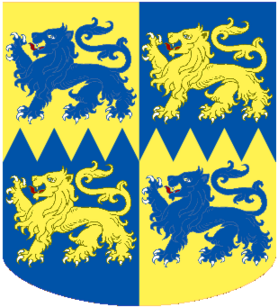Related Research Articles
Sir Allen Apsley was an English merchant, courtier and landowner, lord of the manor of Feltwell, and Naval administrator. He was Surveyor of Marine Victuals of the Royal Navy from 1612 to 1630.
Sir John Barrington, 3rd Baronet of Barrington Hall, Essex was an English lawyer and politician who sat in the House of Commons at various times between 1645 and 1679.

Sir John St John, 1st Baronet of Lydiard Tregoze in the English county of Wiltshire, was a Member of Parliament and prominent Royalist during the English Civil War. He was created a baronet on 22 May 1611.
Sir John Walter was an English judge and Member of Parliament.
Montagu Venables-Bertie, 2nd Earl of Abingdon PC, styled Hon. Montagu Bertie until 1682 and Lord Norreys from 1682 to 1699, was an English nobleman.

Sir John Cutler, 1st Baronet (1603–1693) was an English grocer, financier and Member of Parliament.
The Pettus Baronetcy of Rackheath in Norfolk, England, was a title in the Baronetage of England. It was created on 23 September in 1641 for Thomas Pettus, the High Sheriff of Norfolk. The sixth Baronet was the High Sheriff of Norfolk in 1746. The title became extinct on his death in 1772.
James Annesley, 2nd Earl of Anglesey FRS, styled Lord Annesley from 1661 to 1686, was a British peer.

John Poulett, 1st Baron Poulett, of Hinton St George, Somerset, was an English sailor and politician who sat in the House of Commons between 1610 and 1621 and was later raised to the peerage.

Thomas Cromwell, 1st Earl of Ardglass, 11 June 1594 to 20 November 1653, was an English nobleman, son of Edward Cromwell, 3rd Baron Cromwell and his second wife Frances Rugge.

Wingfield Cromwell, 2nd Earl of Ardglass, DCL, was an English nobleman, son of Thomas Cromwell, 1st Earl of Ardglass and Elizabeth Meverell. He held the subsidiary titles of 2nd Viscount Lecale and 5th Baron Cromwell of Oakham.
Sir Thomas Windebank, 1st Baronet was Member of Parliament (M.P.) for Wootton Bassett and supported the Royalist cause in the English Civil War. He was Clerk of the Signet from 1641 until 1645 and again from 1660 to 1674.

Sir Robert Barnham, 1st Baronet of Boughton Monchelsea Place was an English politician who sat in the House of Commons from 1660 to 1679.
Sir Gilbert Gerard, 1st Baronet of Fiskerton was an English soldier and politician. During the English Civil War he supported the Royalist cause. After the Restoration he sat in the House of Commons from 1661 to 1685.
Sir William Essex, 1st Baronet, was an English politician who sat in the House of Commons between 1597 and 1601.
Ratcliffe Gerard of Halsall, Lancashire was a Royalist officer during the English Civil War.
Colonel Sir Gilbert Gerard was a Royalist officer during the English Civil War.
Sir John Thornycroft, 1st Baronet was an English Barrister-at-Law.
William Sandys, 6th Baron Sandys, was a Cavalier officer in the Royalist army during the English Civil War.
Sir Robert Pollock, 1st Baronet (c.1665–1735), of Pollok, was a British Army officer and Scottish politician who sat in the Parliament of Scotland from 1700 to 1707 and in the British House of Commons from 1707 to 1722.
References
- 1 2 Baggs, A P; Blair, W J; Chance, Eleanor; Colvin, Christina; Cooper, Janet; Day, C J; Selwyn, Nesta; Townley, S C (1990). "Wolvercote: Manors and other estates". In Crossley, Alan; Elrington, C R (eds.). A History of the County of Oxford. Vol. 12, Wootton Hundred (southern) including Woodstock. London: Victoria County History. pp. 313–314.
- ↑ Burke, John Bernard (1838). "A genealogical and heraldic history of the extinct and dormant baronetcies of England, by J. And J.B. Burke".
- ↑ Banks, Thomas Christopher (1809). The Dormant and Extinct Baronage of England: Or, An Historical and Genealogical Account of the Lives, Public Emploiments, and Most Memorable Actions, of the English Nobility who Have Flourished from the Norman Conquest to the Year 1806: Deduced from Public Records, Ancient Historians, the Works of Eminent Heralds, and from Other Celebrated and Approved Authorities. London: T. Bensley. p. 52.
- 1 2 3 Palmer, F. P.; Crowquill, Alfred; Forrester, Alfred Henry (1846). The Wanderings of a Pen and Pencil. London: Jeremiah How. p. 209.
- ↑ Falkner, John Meade (1899). A History of Oxfordshire. London: E. Stock. p. 244.
- ↑ Forbes, Eric Gray; Murdin, Lesley; Wilmoth, Frances (1995). The Correspondence of John Flamsteed, The First Astronomer Royal. Philadelphia, PA: IOP Publishing. p. 906. ISBN 978-0-7503-0147-3.